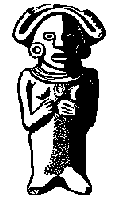

 http://www.txinfinet.com/mader/planeta/0296/0296mexoax.html (PC Press Internet CD, 03/1996)
http://www.txinfinet.com/mader/planeta/0296/0296mexoax.html (PC Press Internet CD, 03/1996)
Coffee grower Alberto Perez Mariscal is my host and guide on a trip to the coffee plantations along the west slopes of the Sierra Madre del Sur.
During this drive from Oaxaca we discuss the politics, economics and sociology associated with the coffee industry in the state of Oaxaca. The growers are working toward having their plantations declared part of Mexico's ecological reserves. This would preserve the jungle which provides valuable natural resources, the right conditions for raising coffee, and an ecotourism attraction.
As we crest the mountains and start down toward the Pacific, the cool dry air warms and becomes noticeably more humid. We turn on to an unmarked, narrow, gravel road.
Small puddles form in the tire ruts. In the quiet of the jungle we hear birds calling, water rushing downhill, and, occasionally, the sounds of human presence - children laughing, rosters crowing, donkeys braying. Still, we can't see them through the dense understory.
The jungle parts at Plume Hedalgo, a community of about 4000 people perched, literally, on the razor edge of a mountain ridge. Wispy clouds are all around and below us.
To the west lies the Pacific Ocean and to the southwest, the Gulf of Tehuantepce. Behind that hill on the left is Santa Cruz Huatulco one of Mexico's newest costal resort areas.
As we walk the cobble stone main street, the only street in Plume Hedalgo, I am aware of the relationship of the people to nature. Two hundred meters in any direction looms dense jungle.
In the village people interact as they do in any small town - seemingly unaware of the isolation and the breath-taking beauty of the setting. A slight breeze carries the smell of fresh coffee beans, stacked in bags at the buyers shed. But where are the plantations?
It's nearly impossible to distinguish the boundary between natural jungle vegetation and the plantations. Here coffee is a shade crop grown as the understory in this mountain jungle.
Preservation of traditional coffee culture techniques is a primary concern for the growers and their workers. They do not clear-cut, or use commercial pesticides, chemical fertilizers, or harvesting machines. Hand labor is essential for carefully removing competing shrubs, planting new coffee bushes, pruning the coffee and the shade trees, and for harvesting. Topography is too steep for machinery. Coffee growing here is expensive. However, this careful hand culturing leaves the land in tact. There is little visible erosion. From a distance of 30 meters, it looks like untouched jungle.
The coffee growers consider themselves benefactors of the local peoples. They provide significant employment for many villagers including some of the women and children.
The workers benefit by remaining with their families and living close to their work, by having guaranteed employment, and by the possibility of becoming plantation owners themselves. Sometimes the workers are paid with coffee plants or land rather than, or in addition to, money. Ecotourism would contribute to the village economies.
With close proximity to the costal tourist areas of Huatulco, Puerto Angle and Puerto Escondito, single day and overnight trips to this coffee growing area are possible. Spectacular views, colorful butterflies, exotic birds and plants, and gracious and friendly people are here in the jungle villages and coffee plantations. Eventually populations of native mammals such as deer and river otter will be reestablished here too. Protective breedings of these animals is envisioned as one of the short-term goals. Nature tours, plantation tours, sustainable agriculture workshops are the visions of Alberto and his fellow coffee growers. Achieving this will require careful planning, financing, and development.
If you have expertise in ecotourism and are interested in assisting, please contact:
Alberto Perez Mariscal, Technical Secretary
Union Estatal de Productores de Cafe
Posada la Casa de la Tia
Cinco de Mayo 108, Centro
Oaxaca 68000 Oaxaca
Mexico
The author is a wildlife biologist working for the Minnesota Extension Service at the University of Minnesota and can be contacted via email at JRK@finsandfur.fw.umn.edu or via fax at (612) 625-5299.